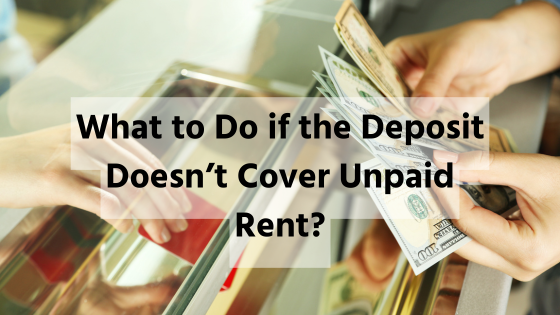What to Do if the Deposit Doesn’t Cover Unpaid Rent?

Are you facing a situation where your resident has left, and their security deposit falls short of covering unpaid rent?
It’s a frustrating scenario that many landlords experience, and it can leave you wondering how to recover the remaining balance without causing legal headaches. While a deposit is meant to offer some protection, unpaid rent can easily exceed what you’ve collected.
In this article, we’ll explore the steps you can take to safeguard your rental income and address the gap left by an insufficient deposit. Understanding your rights and options will help you navigate this challenge efficiently and minimize future risks. Keep reading to learn more!
Smart Tips for Landlords When Deposit Falls Short on Rent
Here are 8 practical steps landlords can take if the deposit doesn’t cover unpaid rent:
Review the Lease Agreement
Start by going over the rental agreement to see exactly what was agreed upon regarding unpaid rent and how the security deposit can be applied. Many leases stipulate that the deposit can be used to cover unpaid rent, damages, or other costs.
Knowing the specific terms will provide clarity on how to proceed and strengthen your case if you need to escalate the situation.

Send a Formal Demand Letter
A well-drafted formal demand letter is the next step. This letter should outline the exact amount of unpaid rent, how it was calculated, and the shortfall after applying the security deposit. It’s crucial to be clear, professional, and firm in your tone.
The letter should also set a clear deadline for payment, typically 10-14 days, giving the resident time to resolve the matter before further action is taken. Having a demand letter on file can also be important if legal proceedings are necessary later.
Set Up a Payment Plan
If the resident shows a willingness to cooperate but is unable to pay the entire balance upfront, offering a payment plan can be an effective solution.
Negotiate a realistic, structured payment schedule that works for both parties. For example, you might agree on monthly payments over a set period.
This option is often less costly and time-consuming than legal action. Ensure that all terms are documented in writing, so both you and the resident have a clear record of the arrangement.
Deduct from the Deposit
Apply the resident’s security deposit toward the unpaid rent, as per the lease agreement. Document exactly how the deposit is being used, whether it’s covering the full amount of unpaid rent or only a portion.

It’s important to provide the resident with a detailed breakdown showing the application of the deposit toward their debt, keeping the process transparent.
This not only protects you legally but also helps maintain professionalism, even in difficult situations. If the deposit doesn’t fully cover the outstanding balance, use this as leverage when requesting further payment.
Report to Credit Agencies
Reporting unpaid rent to credit agencies can incentivize your former resident to clear the debt, as it directly impacts their credit score. A negative mark on their credit report can hinder their ability to rent in the future, apply for loans, or obtain credit cards.
To report unpaid rent, you may need to contact a credit bureau or work with a property management company that specializes in rental debt. This step often prompts payment, as many individuals seek to avoid long-term credit damage.
Document Everything
Throughout the process, maintain thorough records of every action taken, including communications with the resident, details of unpaid rent, demand letters, any agreements reached, and how the deposit was applied. These records are critical if the situation escalates to legal proceedings.
Documenting everything helps protect your interests, ensures accuracy, and provides a paper trail that can serve as evidence in court.

Having clear records can prevent any disputes or confusion about how the unpaid rent issue was handled, especially if the resident later contests the charges.
Update Screening Processes
To prevent similar situations from occurring in the future, it’s important to review and possibly tighten your resident screening process. This might involve taking extra care when verifying income, employment stability, and credit history.
Consider implementing more robust credit and background checks, and requiring a higher security deposit in cases where financial reliability is uncertain.
Strengthening these processes helps you better assess potential residents’ ability to meet rent obligations, reducing the likelihood of facing unpaid rent issues again. Investing in stronger screening upfront can save significant time and stress later.
Hire a Property Management Company
If your efforts to recover unpaid rent directly from the resident are unsuccessful, hiring a property management company may be an effective option.
Property management companies specialize in recovering debts, and they have the tools, resources, and legal knowledge to track down former residents and recover funds on your behalf.
Make sure you choose a reputable agency with experience in handling landlord-resident disputes, like IPM Property Management, to ensure professionalism and compliance with legal regulations.
Bottom Line
Dealing with unpaid rent can be challenging, but IPM Property Management is here to help you navigate these issues smoothly.
With our expertise, we can guide you through the legal processes, offer debt recovery solutions, and help you strengthen your resident screening practices to avoid future problems.
Reach out to IPM Chico, a local property management company, today to discuss your options and determine the right approach for recovering unpaid rent and protecting your investment.
